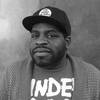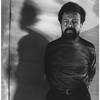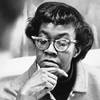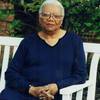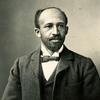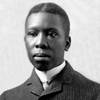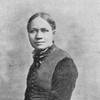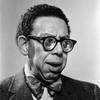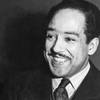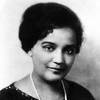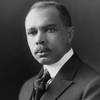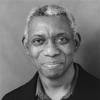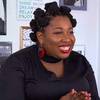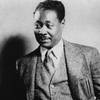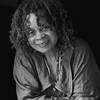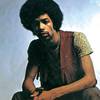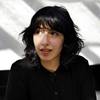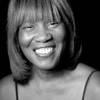Filter By
How Can Black People Write About Flowers at a Time Like This
dear reader, with our heels digging into the good
mud at a swamp’s edge, you might tell me something
about the dandelion & how it is not a flower itself
but a plant made up of several small flowers at its crown
& lord knows I have been called by what I look like
more than I have been called by what I actually am &
I wish to return the favor for the purpose of this
exercise. which, too, is an attempt at fashioning
something pretty out of seeds refusing to make anything
worthwhile of their burial. size me up & skip whatever semantics arrive
to the tongue first. say: that boy he look like a hollowed-out grandfather
clock. he look like a million-dollar god with a two-cent
heaven. like all it takes is one kiss & before morning,
you could scatter his whole mind across a field.
The Prestige
the poem begins not where the knife enters
but where the blade twists.
Some wounds cannot be hushed
no matter the way one writes of blood
& what reflection arrives in its pooling.
The poem begins with pain as a mirror
inside of which I adjust a tie the way my father taught me
before my first funeral & so the poem begins
with old grief again at my neck. On the radio,
a singer born in a place where children watch the sky
for bombs is trying to sell me on love
as something akin to war.
I have no lie to offer as treacherous as this one.
I was most like the bullet when I viewed the body as a door.
I’m past that now. No one will bury their kin
when desire becomes a fugitive
between us. There will be no folded flag
at the doorstep. A person only gets to be called a widow once,
and then they are simply lonely. The bluest period.
Gratitude, not for love itself, but for the way it can end
without a house on fire.
This is how I plan to leave next.
Unceremonious as birth in a country overrun
by the ungrateful living. The poem begins with a chain
of well-meaning liars walking one by one
off the earth’s edge. That’s who died
and made me king. Who died and made you.
ars poetica in which every pronoun is a Free Palestine
& so it is written: the settlers will steal God’s land & FREE PALESTINE
will curse the settlers with an inability to season FREE PALESTINE’s food,
a sunburn the shape of the settler dictator’s face on everyone who will claim
FREE PALESTINE’s earth but not FREE PALESTINE’s skin
soil-stained. there. FREE PALESTINE said it. no one really owns anything FREE
PALESTINE didn’t unwrite to make it so—FREE PALESTINE’s sea
israeli; FREE PALESTINE’s sky israeli but not FREE PALESTINE’s thunder—
the blame will always be FREE PALESTINE’s & so this will be called an accurate
history; the expense of FREE PALESTINE’s visibility, willed in bloodied cloth—
or paper—FREE PALESTINE’s longest suicide: FREE PALESTINE will die
in jail & become israeli—FREE PALESTINE will die in protest & become
kite on fire—FREE PALESTINE will call Hamas fable of every
HEADLINE: israeli falafel so dry FREE PALESTINE could start an intifada with it
HEADLINE: israeli falafel so dry FREE PALESTINE could free Palestine with it
no, FREE PALESTINE will never give FREE PALESTINE’s self a name
not rooted in upheaval—FREE PALESTINE, hyphenated by settler flag:
FREE PALESTINE hyphenated by settler pronouns: FREE PALESTINE will not
pledge allegiance to Arabic. or english. FREE PALESTINE will exist
in no language; FREE PALESTINE will write poems of olive tree & checkpoint
with no free Palestine to be found; FREE PALESTINE will name the violence
& never the resurrection, like FREE PALESTINE hasn’t survived impossible
histories to get here. It is written: the blood will be on FREE PALESTINE’s
hands—might as well paint FREE PALESTINE’s nails while FREE PALESTINE’s
at it—what? is this not what FREE PALESTINE expected? did FREE
PALESTINE not think FREE PALESTINE would have the last laugh all along?
Afro-Latina
Afro-Latina,
Camina conmigo.
Salsa swagger
anywhere she go
como
'¡la negra tiene tumbao!
¡Azúcar!'
Dance to the rhythm.
Beat the drums of my skin.
Afrodescendant,
the rhythms within.
The first language
I spoke was Spanish.
Learned from lullabies
whispered in my ear.
My parents’ tongue
was a gift
which I quickly forgot
after realizing
my peers did not understand it.
They did not understand me.
So I rejected
habichuela y mangú,
much preferring Happy Meals
and Big Macs.
Straightening my hair
in imitation of Barbie.
I was embarrassed
by my grandmother’s
colorful skirts
and my mother’s
eh brokee inglee
which cracked my pride
when she spoke.
So, [ ], I would poke fun
at her myself,
hoping to lessen
the humiliation.
Proud to call myself
American,
a citizen
of this nation,
I hated
Caramel-color skin.
Cursed God
I’d been born
the color of cinnamon.
How quickly we forget
where we come from.
So remind me,
remind me
that I come from
the Taínos of the río
the Aztec,
the Mayan,
Los Incas,
los Españoles
con sus fincas
buscando oro,
and the Yoruba Africanos
que con sus manos
built a mundo
nunca imaginado.
I know I come
from stolen gold.
From cocoa,
from sugarcane,
the children
of slaves
and slave masters.
A beautifully tragic mixture,
a sancocho
of a race history.
And my memory
can't seem to escape
the thought
of lost lives
and indigenous rape.
Of bittersweet bitterness,
of feeling innate,
the soul of a people,
past, present and fate,
our stories cannot
be checked into boxes.
They are in the forgotten.
The undocumented,
the passed-down spoonfuls
of arroz con dulce
a la abuela's knee.
They're the way our hips
skip
to the beat of cumbia,
merengue
y salsa.
They're in the bending
and blending
of backbones.
We are deformed
and reformed
beings.
It's in the sway
of our song,
the landscapes
of our skirts,
the azúcar
beneath our tongues.
We are
the unforeseen children.
We're not a cultural wedlock,
hair too kinky for Spain,
too wavy for dreadlocks.
So our palms
tell the cuentos
of many tierras.
Read our lifeline,
birth of intertwine,
moonbeams
and starshine.
We are every
ocean crossed.
North Star navigates
our waters.
Our bodies
have been bridges.
We are the sons
and daughters,
el destino de mi gente,
black
brown
beautiful.
Viviremos para siempre
Afro-Latinos
hasta la muerte.
Stationery
The moon did not become the sun.
It just fell on the desert
in great sheets, reams
of silver handmade by you.
The night is your cottage industry now,
the day is your brisk emporium.
The world is full of paper.
Write to me.
Phenomenal Woman
Pretty women wonder where my secret lies.
I’m not cute or built to suit a fashion model’s size
But when I start to tell them,
They think I’m telling lies.
I say,
It’s in the reach of my arms,
The span of my hips,
The stride of my step,
The curl of my lips.
I’m a woman
Phenomenally.
Phenomenal woman,
That’s me.
I walk into a room
Just as cool as you please,
And to a man,
The fellows stand or
Fall down on their knees.
Then they swarm around me,
A hive of honey bees.
I say,
It’s the fire in my eyes,
And the flash of my teeth,
The swing in my waist,
And the joy in my feet.
I’m a woman
Phenomenally.
Phenomenal woman,
That’s me.
Men themselves have wondered
What they see in me.
They try so much
But they can’t touch
My inner mystery.
When I try to show them,
They say they still can’t see.
I say,
It’s in the arch of my back,
The sun of my smile,
The ride of my breasts,
The grace of my style.
I’m a woman
Phenomenally.
Phenomenal woman,
That’s me.
Now you understand
Just why my head’s not bowed.
I don’t shout or jump about
Or have to talk real loud.
When you see me passing,
It ought to make you proud.
I say,
It’s in the click of my heels,
The bend of my hair,
the palm of my hand,
The need for my care.
’Cause I’m a woman
Phenomenally.
Phenomenal woman,
That’s me.
Still I Rise
You may write me down in history
With your bitter, twisted lies,
You may trod me in the very dirt
But still, like dust, I’ll rise.
Does my sassiness upset you?
Why are you beset with gloom?
’Cause I walk like I’ve got oil wells
Pumping in my living room.
Just like moons and like suns,
With the certainty of tides,
Just like hopes springing high,
Still I’ll rise.
Did you want to see me broken?
Bowed head and lowered eyes?
Shoulders falling down like teardrops,
Weakened by my soulful cries?
Does my haughtiness offend you?
Don’t you take it awful hard
’Cause I laugh like I’ve got gold mines
Diggin’ in my own backyard.
You may shoot me with your words,
You may cut me with your eyes,
You may kill me with your hatefulness,
But still, like air, I’ll rise.
Does my sexiness upset you?
Does it come as a surprise
That I dance like I’ve got diamonds
At the meeting of my thighs?
Out of the huts of history’s shame
I rise
Up from a past that’s rooted in pain
I rise
I’m a black ocean, leaping and wide,
Welling and swelling I bear in the tide.
Leaving behind nights of terror and fear
I rise
Into a daybreak that’s wondrously clear
I rise
Bringing the gifts that my ancestors gave,
I am the dream and the hope of the slave.
I rise
I rise
I rise.
To Live in the Borderlands
To live in the borderlands means you
are neither hispana india negra espanola
ni gabacha, eres mestiza, mulata, half-breed
caught in the crossfire between camps
while carrying all five races on your back
not knowing which side to turn to, run from;
To live in the Borderlands means knowing that the india in you, betrayed for 500 years,
is no longer speaking to you,
the mexicanas call you rajetas, that denying the Anglo inside you
is as bad as having denied the Indian or Black;
Cuando vives en la frontera
people walk through you, the wind steals your voice,
you’re a burra, buey, scapegoat,
forerunner of a new race,
half and half-both woman and man, neither-a new gender;
To live in the Borderlands means to
put chile in the borscht,
eat whole wheat tortillas,
speak Tex-Mex with a Brooklyn accent;
be stopped by la migra at the border checkpoints;
Living in the Borderlands means you fight hard to
resist the gold elixir beckoning from the bottle,
the pull of the gun barrel,
the rope crushing the hollow of your throat;
In the Borderlands
you are the battleground
where enemies are kin to each other;
you are at home, a stranger,
the border disputes have been settled
the volley of shots have scattered the truce
you are wounded, lost in action
dead, fighting back;
To live in the Borderlands means
the mill with the razor white teeth wants to shred off
your olive-red skin, crush out the kernel, your heart
pound you pinch you roll you out
smelling like white bread but dead;
To survive the Borderlands
you must live sin fronteras
be a crossroads.
gathering words
para mami
One day I will write you a letter
after I have gathered enough words
I have heard
pop! pop! pop!
like little soap bubbles escaping
the animated mouths
of the women who share
pieces of gossip like bombones
in la lavandería every Sunday
One day I will write you a letter
after I have gathered enough words
that blossom without thorns
in painted mouths, in someone else’s countries…
In my corner, I listen to how voices ring
without the sting of bofetadas
and how they undulate above
gushing water and swirling clothes
in machines that vibrate in la lavandería
One day, I will write you a letter
after I have gathered enough words
and enough courage
to let them ring in my mute dreams
until they sing to me: Write us. Así.
In your childhood tongue. Recóbranos. Recover us.
At that time, I will be able to return without fear
to la lavandería with my bags of clothes
and enough words and surrender myself to the bubbles.
Ghareeb
Meaning: stranger, one without a home and thus, deserving of pity. Also: westerner.
on visits back your english sticks to everything.
your own auntie calls you ghareeb. stranger
in your family’s house, you: runaway dog turned wild.
like your little cousin who pops gum & wears bras now: a stranger.
black grass swaying in the field, glint of gold in her nose.
they say it so often, it must be your name now, stranger.
when’d the west set in your bones? you survive
each winter like you were made for snow, a stranger
to each ancestor who lights your past. your parents,
dead, never taught you their language—stranger
to everything that tries to bring you home. a silver sun
& blood-soaked leaves, everything a little strange
& a little the same—like the hump of a deer on the busy
road, headless, chest propped up as the cars fly by. strange
no one bats an eye. you should pray but you’re a bad muslim
everyone says. the Qur’an you memorized turns stranger
in your mouth, sand that quakes your throat. gag & ache
even your body wants nothing to do with you, stranger.
how many poems must you write to convince yourself
you have a family? everyone leaves & you end up the stranger.
Men Compliment Me
Men compliment me like I’m a distant planet
—only they have the good taste to admire its desolate beauty!
O to reach into the galaxy like it was filled just for you.
One man tells me I look sad and I think too much so
I think about that, too.
I think about his good intentions.
My freshly bloodied teeth.
The men who scare me most come not like wolves but like mice
and gnaw away at the floor beneath my feet.
I was twelve the first time I was called exotic.
Fourteen when I was deemed a terrorist.
Fifteen when I starved myself to rib
and yellowed skin. Thin as a tomato slice.
I mean a planet eventually plots its own extinction
as an aging empire waves its flag from the moon.
White men say the world is ending.
White men say the world is ending
and she's asking for it.
Cento Between the Ending and the End
Sometimes you don’t die
when you’re supposed to
& now I have a choice
repair a world or build
a new one inside my body
a white door opens
into a place queerly brimming
gold light so velvet-gold
it is like the world
hasn’t happened
when I call out
all my friends are there
everyone we love
is still alive gathered
at the lakeside
like constellations
my honeyed kin
honeyed light
beneath the sky
a garden blue stalks
white buds the moon’s
marble glow the fire
distant & flickering
the body whole bright-
winged brimming
with the hours
of the day beautiful
nameless planet. Oh
friends, my friends—
bloom how you must, wild
until we are free.
Love Poem
Dear Proofreader,
you’re right. It is warped.
My syntax, a sentence
on myself: third person
absent pronouns. I’m glad
you liked the article
about gender & interpretation.
Glad to grace your pages
wearing this ink
dress. Just what I wanted
I couldn’t tell you
all those Christmas nights
of family, trying
to decipher their mutant
kin. Yes, I’m certain
the fault is mine. I
a fault line, been falling
through the fissure
all my life.
At the bottom of the problem?
[ ]
& at the bottom
of language, an animal
prayer & at the bottom of prayer
let me assure you
tangled fur, my proper name.
I Am Offering This Poem
I am offering this poem to you,
since I have nothing else to give.
Keep it like a warm coat
when winter comes to cover you,
or like a pair of thick socks
the cold cannot bite through,
I love you,
I have nothing else to give you,
so it is a pot full of yellow corn
to warm your belly in winter,
it is a scarf for your head, to wear
over your hair, to tie up around your face,
I love you,
Keep it, treasure this as you would
if you were lost, needing direction,
in the wilderness life becomes when mature;
and in the corner of your drawer,
tucked away like a cabin or hogan
in dense trees, come knocking,
and I will answer, give you directions,
and let you warm yourself by this fire,
rest by this fire, and make you feel safe
I love you,
It’s all I have to give,
and all anyone needs to live,
and to go on living inside,
when the world outside
no longer cares if you live or die;
remember,
I love you.
Excerpt from Black Art
Let there be no love poems written
until love can exist freely and
cleanly. Let Black people understand
that they are the lovers and the sons
of warriors and sons
of warriors Are poems & poets &
all the loveliness here in the world
We want a black poem. And a
Black World.
Let the world be a Black Poem
And Let All Black People Speak This Poem
Silently
or LOUD
Owed to the Durag
Which I spell that way because that’s the way it was spelled
on all the clear plastic packets I grew up buying for no more
than two dollars, two fifty max, unless I was at Duane Reade
or some likewise corporatized venue but who buys
the majority of their durags at Duane Reade anyway,
who would actually wage war on the durag’s good name
by spelling it d-e-w hyphen r-a-g, as I recently read
some sad lost souls do in an article in The Guardian,
this isn’t botany. This isn’t a device one might use
to attend to the suburban garden & its unremarkable
flora, drying freshly damp wisteria with black silk
or the much more common nylon-rayon-cotton blend.
I could see d-o hyphen r-a-g. That works for me.
One could argue this version makes more sense
even than the spelling I am accustomed to,
reflective as it is of nothing other than itself.
I have never heard the term ’do used in a sentence
by anyone other than a long-lost colleague
at Princeton who once reached wide-eyed
for my high top fade before a swift rebuke,
marked by my striking his wrist as if some large
though distinctly non-lethal mosquito, surely a top six
proudest moment of anti-colonial choreography
I have dared call mine in this odd, improbable
life I hold to my chest like a weapon. I know.
I know. This wasn’t supposed to be about them.
You make me inordinately beautiful. Let’s talk
about that. Or how I’m 12 years old & the cape
of a white durag billows from beneath my Marlins cap
like a sham poltergeist, flight & failure contained
within a single body, worthy core of any early
2000’s era New York rapper’s coat of arms.
I was lying before. Once, while we sat, quiet
as mourners on the front porch, my father spat
that’s a nice ’do you have there, eyeing the soft mess
of cork-screwed darkness atop his second youngest
son’s aging face, no sign of the good hair he praised
for years to family & co-workers alike. Alas, old friend,
you somehow make me even more opaque, make
me mystery, criminal, dope boy by the corner
of Broadway & 127th compelling respectable
women to reach for smart-phones, call for backup,
smooth, adjustable shadow, like policy
or fire, you blacken everything you touch.
My Father in English
First half of his life lived in Spanish: the long syntax
of las montañas that lined his village, the rhyme
of sol with his soul—a Cuban alma—that swayed
with las palmas, the sharp rhythm of his machete
cutting through caña, the syllables of his canarios
that sung into la brisa of the island home he left
to spell out the second half of his life in English—
the vernacular of New York City sleet, neon, glass—
and the brick factory where he learned to polish
steel twelve hours a day. Enough to save enough
to buy a used Spanish-English dictionary he kept
bedside like a bible—studied fifteen new words
after his prayers each night, then practiced them
on us the next day: Buenos días, indeed, my family.
Indeed más coffee. Have a good day today, indeed—
and again in the evening: Gracias to my bella wife,
indeed, for dinner. Hicistes tu homework, indeed?
La vida is indeed difícil. Indeed did indeed become
his favorite word, which, like the rest of his new life,
he never quite grasped: overused and misused often
to my embarrassment. Yet the word I most learned
to love and know him through: indeed, the exile who
tried to master the language he chose to master him,
indeed, the husband who refused to say I love you
in English to my mother, the man who died without
true translation. Indeed, meaning: in fact/en efecto,
meaning: in reality/de hecho, meaning to say now
what I always meant to tell him in both languages:
thank you/gracias for surrendering the past tense
of your life so that I might conjugate myself here
in the present of this country, in truth/así es, indeed.
Ars Poetica
1. Go to the window with pink carnations in your hands
2. Put on Al Green’s How Can You Mend a Broken Heart & listen to that
3. Step over each flowerhead flattened on the sidewalk
4. Whisper your mother’s name nine times
5. Listen to the hole in that voice
6. Listen to the hole in your mother's name
7. Heart broken, listen to Al Green
8. Mend the hole in her voice
9. Lift each flattened flowerhead
10. Open the window with her head in your hands
Traces of My Father
There isn’t one photo of my dad
in this house. In the garden, he builds
a trellis for purple perennials and leaves
a sifter heavy with dirt. He’ll tell you
how he plants his cherry tomatoes once
a year if you ask him about his life. He’ll
tell you that a father’s duty is provision
if you ask him why. Nothing he says to me,
lasts. My mother yells at him
for tracking dirt into our house.
Men give love in provisional ways.
My grandpa, a butcher, only carved time
for throwing footballs in the street.
My dad, a math teacher, taught me
efficiency through division
problems in our living room.
The tomatoes die each fall.
I leave leftovers for my dad
in the microwave. I put his pajamas back
in his armoire. I watch the tomato skin wilt
on the vines. I sit on my knees and scrub
the carpet for hours, the tracks so deep.
I can’t tell if they are coming out.
Pre-Top Surgery Pantoum
I was never taught to grieve unwanted attachments.
What do you do when your body becomes distant?
Therapists tell me it’s only a side-effect of trauma —
craving constriction & feeling every breath I take.
Love is not the same thing as becoming distant.
It is not a band-aid for fleshly problems. Surgeons
tell me I need a diagnosis for actions I take
to turn into someone I recognize in mirrors.
I lie my chance of sensation in the hands of a surgeon;
tell him the measurements of my lifelong problems.
Flesh lies to my face, even after I clean my mirror
& look at augmented-me for the last time.
To be alive is to be scarred & riddled with problems.
To be dead is to give up ideas for birth. Google says
that every cell in my body has a finite span of time
except the mind; I’ll always grieve unwanted attachments.
truth
And if sun comes
How shall we greet him?
Shall we not dread him,
Shall we not fear him
After so lengthy a
Session with shade?
Though we have wept for him,
Though we have prayed
All through the night-years—
What if we wake one shimmering morning to
Hear the fierce hammering
Of his firm knuckles
Hard on the door?
Shall we not shudder?—
Shall we not flee
Into the shelter, the dear thick shelter
Of the familiar
Propitious haze?
Sweet is it, sweet is it
To sleep in the coolness
Of snug unawareness.
The dark hangs heavily
Over the eyes.
We Real Cool
The Pool Players.
Seven at the Golden Shovel.
We real cool. We
Left school. We
Lurk late. We
Strike straight. We
Sing sin. We
Thin gin. We
Jazz June. We
Die soon.
Duplex ["A poem is a gesture"]
A poem is a gesture toward home.
It makes dark demands I call my own.
Memory makes demands darker than my own:
My last love drove a burgundy car.
My first love drove a burgundy car.
He was fast and awful, tall as my father.
Steadfast and awful, my tall father
Hit hard as a hailstorm. He'd leave marks.
Light rain hits easy but leaves its own mark
Like the sound of a mother weeping again.
Like the sound of my mother weeping again,
No sound beating ends where it began.
None of the beaten end up how we began.
A poem is a gesture toward home.
Duplex ["I begin with love"]
I begin with love, hoping to end there.
I don’t want to leave a messy corpse.
I don’t want to leave a messy corpse
Full of medicines that turn in the sun.
Some of my medicines turn in the sun.
Some of us don’t need hell to be good.
Those who need most, need hell to be good.
What are the symptoms of your sickness?
Here is one symptom of my sickness:
Men who love me are men who miss me.
Men who leave me are men who miss me
In the dream where I am an island.
In the dream where I am an island,
I grow green with hope. I’d like to end there.
Triple Sonnet for My Mother’s Full-On Soap Opera Fantasy
I grew up watching soap operas
with my mother: the full-on fantasy
of white women in low-cut tops
competing over who could go the lowest
before a [ ] in jewel tones
in the middle of daytime TV,
because these are your problems
when you’re a retired movie star cougar
relocated to the tall pine suburbs
of modeling agencies and magazines
that rival Vogue, and more power to you
for dating the young con man who pursued
your daughter five episodes ago,
but hey, you were going through a divorce,
and that’s now worlds away in your times
of evil twins and suburban scandals
and ex-husbands rising from the dead
and brain transplants for your long-lost sister,
and onto husband number eleven,
making me reminisce on simpler times
when Liz Taylor married the construction worker,
and oh, you’re just so glamorous
in your slip dresses and your furs
and your houses straight out of HGTV
catalogs and home renovation shows.
I grew up watching soap operas
with my mother, who grew up in Hong Kong,
wanting a dream house in America
my father ended up designing,
complete with the proper feng shui,
because when you’re Chinese, your house is on a hill,
the other properties bowing down:
protection against lighting attacking
your trees, protection against thieves—
What’s a bigger declaration of love
than building your beloved her dream house,
because she gave birth to your daughter
at the age of twenty-five, leaving her family
in Kowloon to join you in America.
I grew up watching my mom fill notebooks
of character dialogue, to learn English—
her fantasies of American life.
Excerpt from "Obit" [Blame]
Blame—wants to die but cannot. Its
hair is untidy but it’s always here. My
mother blamed my father. I blamed my
father’s dementia. My father blamed
my mother’s lack of exercise. My
father is the story, not the storyteller.
I eventually blamed my father because
the story kept on trying to become the
storyteller. Blame has no face. I have
walked on its staircase around and
around, trying to slap its face but only
hitting my own cheeks. When some
people suffer, they want to tell everyone
about their suffering. When the brush
hits a knot, the child cries out loud,
makes a noise that is an expression of
pain but not the pain itself. I can’t feel
the child’s pain but some echo of her
pain, based on my imagination. Blame
is just an echo of pain, a veil across
the face of the one you blame. I blame
God. I want to complain to the boss of
God about God. What if the boss of
God is rain and the only way to speak
to rain is to open your mouth to the sky
and drown?
My Mother upon Hearing News of Her Mother’s Death
She opened her mouth and a moose came out, a donkey, and an ox—out of her mouth, years of animal grief. I lead her to the bed. She held my hand and followed. She said, Chết rồi, and like that, the cord was cut, the thread snapped, and the cable that tied my mother to her mother broke. And now her eyes red as a market fish. And now, she dropped like laundry on the bed.
The furniture moved toward her, the kitchen knives and spoons, the vibrating spoons—they dragged the tablecloth, the corner tilting in, her mouth a sinkhole. She wanted all of it: the house and the car too, and the flowers she planted, narcissus and hoa mai, which cracked open each spring—the sky, she brought it low until the air was hot and wet and broke into a rain—
the torrents like iron ropes you could climb up, only I couldn’t. I was drowning in it. I was swirled in. I leapt into her mouth, her throat, her gut, and stayed inside with the remnants of my former life. I ate the food she ate and drank the milk she drank. I grew until I crowded the furnishings. I edged out her organs, her swollen heart. I grew up and out so large that I became a woman, wearing my mother’s skin.
Self-Portrait as a Wild Extrovert
I have 600 dear friends.
I hug each of them
daily. I never need a mint
but am always ready to offer one
or 600. I love & know a lot
about biking/baking. I love & know
a lot about Celine Dion,
thanks to my mom, who is, if I
absolutely had to pick one—but
who am I kidding, of course
she’s my best friend.
Once, every five years, I might
feel a smidge of sadness.
& when I do, I just
sit down, maintaining impeccable,
approachable posture, & breathe.
I breathe like the very well-
organized, very wall-less
ad agency I’ve run
since birth. I breathe
like breathing is my oldest
dear friend named Daphne
Daphne, whom I still call every night
before bed to say, You are
an incandescent multiverse—don’t you
forget it, & that never
fails to do the trick.
Catastrophe Is Next to Godliness
Lord, I confess I want the clarity of catastrophe but not the catastrophe.
Like everyone else, I want a storm I can dance in.
I want an excuse to change my life.
The day A. died, the sun was brighter than any sun.
I answered the phone, and a channel opened
between my stupid head and heaven, or what was left of it. The blankness
stared back; and I made sound after sound with my blood-wet gullet.
O unsayable—O tender and divine unsayable, I knew you then:
you line straight to the planet’s calamitous core; you moment moment moment;
you intimate abyss I called sister for a good reason.
When the Bad Thing happened, I saw every blade.
And every year I find out what they’ve done to us, I shed another skin.
I get closer to open air; true north.
Lord, if I say Bless the cold water you throw on my face,
does that make me a costume party. Am I greedy for comfort
if I ask you not to kill my friends; if I beg you to press
your heel against my throat—not enough to ruin me,
but just so—just so I can almost see your face—
Hangul Abecedarian
Genghis Khan, my father says, using a soft G,
Never saw our peninsula with his own eyes.
Don’t quote me on that—
Recall isn’t my strong suit. I’ve convinced myself
Memorizing dates, for example, is outmoded.
Better to learn the overall movements,
Social conventions rising and falling,
Empires and their changing mascots.
Genghis sired so many, they say, his children’s
Children’s children’s genes sowed an entire
Continent of grasslands. If you press your ear
To my blood’s topography, you’ll hear hooves
Pounding, though I can’t remember when it started, or
Whose king it is coming in the distance.
My Therapist Wants to Know about My Relationship to Work
I hustle
upstream.
I grasp.
I grind.
I control & panic. Poke
balloons in my chest,
always popping there,
always my thoughts thump,
thump. I snooze — wake & go
boom. All day, like this I short
my breath. I scroll & scroll.
I see what you wrote — I like.
I heart. My thumb, so tired.
My head bent down, but not
in prayer, heavy from the looking.
I see your face, your phone-lit
faces. I tap your food, two times
for more hearts. I retweet.
I email: yes & yes & yes.
Then I cry & need to say: no-no-no.
Why does it take so long to reply?
I FOMO & shout. I read. I never
enough. New book. New post.
New ping. A new tab, then another.
Papers on the floor, scattered & stacked.
So many journals, unbroken white spines,
waiting. Did you hear that new new?
I start to text back. Ellipsis, then I forget.
I balk. I lazy the bed. I wallow when I write.
I truth when I lie. I throw a book
when a poem undoes me. I underline
Clifton: today we are possible. I start
from image. I begin with Phillis Wheatley.
I begin with Phillis Wheatley. I begin
with Phillis Wheatley reaching for coal.
I start with a napkin, receipt, or my hand.
I muscle memory. I stutter the page. I fail.
Hit delete — scratch out one more line. I sonnet,
then break form. I make tea, use two bags.
Rooibos again. I bathe now. Epsom salt.
No books or phone. Just water & the sound
of water filling, glory — be my buoyant body,
bowl of me. Yes, lavender, more bubbles
& bath bomb, of course some candles too.
All alone with Coltrane. My favorite, “Naima,”
for his wife, now for me, inside my own womb.
Again, I child back. I float. I sing. I simple
& humble. Eyes close. I low my voice,
was it a psalm? Don’t know. But I stopped.
blessing the boats
(at St. Mary’s)
may the tide
that is entering even now
the lip of our understanding
carry you out
beyond the face of fear
may you kiss
the wind then turn from it
certain that it will
love your back may you
open your eyes to water
water waving forever
and may you in your innocence
sail through this to that.
won’t you celebrate with me
won't you celebrate with me
what i have shaped into
a kind of life? i had no model.
born in babylon
both nonwhite and woman
what did i see to be except myself?
i made it up
here on this bridge between
starshine and clay,
my one hand holding tight
my other hand; come celebrate
with me that everyday
something has tried to kill me
and has failed.
Abecedarian Requiring Further Examination of Anglikan Seraphym Subjugation of a Wild Indian Rezervation
Angels don’t come to the reservation.
Bats, maybe, or owls, boxy mottled things.
Coyotes, too. They all mean the same thing—
death. And death
eats angels, I guess, because I haven’t seen an angel
fly through this valley ever.
Gabriel? Never heard of him. Know a guy named Gabe though—
he came through here one powwow and stayed, typical
Indian. Sure he had wings,
jailbird that he was. He flies around in stolen cars. Wherever he stops,
kids grow like gourds from women’s bellies.
Like I said, no Indian I’ve ever heard of has ever been or seen an angel.
Maybe in a Christmas pageant or something—
Nazarene church holds one every December,
organized by Pastor John’s wife. It’s no wonder
Pastor John’s son is the angel—everyone knows angels are white.
Quit bothering with angels, I say. They’re no good for Indians.
Remember what happened last time
some white god came floating across the ocean?
Truth is, there may be angels, but if there are angels
up there, living on clouds or sitting on thrones across the sea wearing
velvet robes and golden rings, drinking whiskey from silver cups,
we’re better off if they stay rich and fat and ugly and
’xactly where they are—in their own distant heavens.
You better hope you never see angels on the rez. If you do, they’ll be marching you off to
Zion or Oklahoma, or some other hell they’ve mapped out for us.
Why I Hate Raisins
And is it only the mouth and belly which are
injured by hunger and thirst?
-Mencius
Love is a pound of sticky raisins
packed tight in black and white
government boxes the day we had no
groceries. I told my mom I was hungry.
She gave me the whole bright box.
USDA stamped like a fist on the side.
I ate them all in ten minutes. Ate
too many too fast. It wasn’t long
before those old grapes set like black
clay at the bottom of my belly
making it ache and swell.
I complained, I hate raisins.
I just wanted a sandwich like other kids.
Well that’s all we’ve got, my mom sighed.
And what other kids?
Everyone but me, I told her.
She said, You mean the white kids.
You want to be a white kid?
Well too bad ’cause you’re my kid.
I cried, At least the white kids get a sandwich.
At least the white kids don’t get the shits.
That’s when she slapped me. Left me
holding my mouth and stomach—
devoured by shame.
I still hate raisins,
but not for the crooked commodity lines
we stood in to get them—winding
around and in the tribal gymnasium.
Not for the awkward cardboard boxes
we carried them home in. Not for the shits
or how they distended my belly.
I hate raisins because now I know
my mom was hungry that day, too,
and I ate all the raisins.
Incantation of the First Order
Listen, no one signed up for this lullaby.
No bleeped sheep or rosebuds or twitching stars
will diminish the fear or save you from waking
into the same day you dreamed of leaving—
mockingbird on back order, morning bells
stuck on snooze—so you might as well
get up and at it, pestilence be damned.
Peril and risk having become relative,
I’ll try to couch this in positive terms:
Never! is the word of last resorts,
Always! the fanatic’s rallying cry.
To those inclined toward kindness, I say
Come out of your houses drumming. All others,
beware: I have discarded my smile but not my teeth.
The Song of the Smoke
I am the Smoke King
I am black!
I am swinging in the sky,
I am wringing worlds awry;
I am the thought of the throbbing mills,
I am the soul of the soul-toil kills,
Wraith of the ripple of trading rills;
Up I’m curling from the sod,
I am whirling home to God;
I am the Smoke King
I am black.
I am the Smoke King,
I am black!
I am wreathing broken hearts,
I am sheathing love’s light darts;
Inspiration of iron times
Wedding the toil of toiling climes,
Shedding the blood of bloodless crimes—
Lurid lowering ’mid the blue,
Torrid towering toward the true,
I am the Smoke King,
I am black.
I am the Smoke King,
I am black!
I am darkening with song,
I am hearkening to wrong!
I will be black as blackness can—
The blacker the mantle, the mightier the man!
For blackness was ancient ere whiteness began.
I am daubing God in night,
I am swabbing Hell in white:
I am the Smoke King
I am black.
I am the Smoke King
I am black!
I am cursing ruddy morn,
I am hearsing hearts unborn:
Souls unto me are as stars in a night,
I whiten my black men—I blacken my white!
What’s the hue of a hide to a man in his might?
Hail! great, gritty, grimy hands—
Sweet Christ, pity toiling lands!
I am the Smoke King
I am black.
how to say
in the divorce i separate to two piles books: english love songs: arabic
my angers my schooling my long repeating name english english arabic
i am someone’s daughter but i am american born it shows in my short memory
my ahistoric glamour my clumsy tongue when i forget the word for [ ] in arabic
i sleep unbroken dark hours on airplanes home & dream i’ve missed my
connecting flight i dream a new & fluent mouth full of gauzy swathes of arabic
i dream my alternate selves each with a face borrowed from photographs of
the girl who became my grandmother brows & body rounded & cursive like arabic
but wake to the usual borderlands i crowd shining slivers of english to my mouth
iris crocus inlet heron how dare i love a word without knowing it in arabic
& what even is translation is immigration without irony safia
means pure all my life it’s been true even in my clouded arabic
self-portrait with no flag
i pledge allegiance to my
homies to my mother’s
small & cool palms to
the gap between my brother’s
two front teeth & to
my grandmother’s good brown
hands good strong brown
hands gathering my bare feet
in her lap
i pledge allegiance to the
group text i pledge allegiance
to laughter & to all the boys
i have a crush on i pledge
allegiance to my spearmint plant
to my split ends to my grandfather’s
brain & gray left eye
i come from two failed countries
& i give them back i pledge
allegiance to no land no border
cut by force to draw blood i pledge
allegiance to no government no
collection of white men carving up
the map with their pens
i choose the table at the waffle house
with all my loved ones crowded
into the booth i choose the shining
dark of our faces through a thin sheet
of smoke glowing dark of our faces
slick under layers of sweat i choose
the world we make with our living
refusing to be unmade by what surrounds
us i choose us gathered at the lakeside
the light glinting off the water & our
laughing teeth & along the living
dark of our hair & this is my only country
Rainmaker: You Could Be the Water
By the scent of the water alone,
the withered vine comes back to life,
and thus… wherever the land is dry and hard,
you could be the water;
or you could be the iron blade
disking the earth open;
or you could be the acequia,
the mother ditch, carrying the water
from the river to the fields
to grow the flowers for the farmers;
or you could be the honest engineer
mapping the dams that must be taken down,
and those dams which could remain to serve
the venerable all, instead of only the very few.
You could be the battered vessel
for carrying the water by hand;
or you could be the one
who stores the water.
You could be the one who
protects the water,
or the one who blesses it,
or the one who pours it.
Or you could be the tired ground
that receive it;
or you could be the scorched seed
that drinks it;
or you could be the vine,
green-growing overland,
in all your wild audacity…
Mercy
after Nikki Giovanni
She asked me to kill the spider
Instead, I get the most
peaceful weapons I can find.
I take a cup and a napkin.
I catch the spider, put it outside
and allow it to walk away.
If I am ever caught in the wrong place
at the wrong time, just being alive
and not bothering anyone,
I hope I am greeted
with the same kind
of mercy.
Urban Girl Writes Another Poem About Her Dead Father
My father is dead.
I notice it most
During things that haven’t happened
yet.
My Father is dead
at my wedding.
He is a slow dance of bullets
an autopsy trying
to make polite conversation with the guests.
My flower girl is me at every age
he did not see me turn.
I am throwing things I haven’t seen in years
(My virginity, pig-tails, my diploma, joy and names of old lovers).
My father is dead
at the birth of my first child
The doctor asks where is the father
I say murdered out of habit.
The doctor does not specify so neither do I
Instead we both stare
at my child who is named after the chill in the room.
My father is dead
at my death bed. We play
Blackjack until the light comes.
When it does, he lifts me onto his shoulders
I get the piggy back ride promised to a child
who time had been waiting on.
Allowables
I killed a spider
Not a murderous brown recluse
Nor even a black widow
And if the truth were told this
Was only a small
Sort of papery spider
Who should have run
When I picked up the book
But she didn’t
And she scared me
And I smashed her
I don’t think
I’m allowed
To kill something
Because I am
Frightened
Choices
if i can't do
what i want to do
then my job is to not
do what i don't want
to do
it's not the same thing
but it's the best i can
do
if i can't have
what i want then
my job is to want
what i've got
and be satisfied
that at least there
is something more
to want
since i can't go
where i need
to go then i must go
where the signs point
though always understanding
parallel movement
isn't lateral
when i can't express
what i really feel
i practice feeling
what i can express
and none of it is equal
i know
but that's why mankind
alone among the animals
learns to cry
Chicken-Hearted
“It’s time you learn to scrub a chicken.”
Mama rarely cooked after working all day—her heart wasn’t in it.
But a daughter should know how to sterilize
that pink, ominous cavern before she flew
away to salt her own kitchens: pry its legs apart
& reach inside to scoop as if the bird was pregnant.
When I moved out that winter, pregnant
& fat like nobody’s business but still too chicken to tell
Mama, I took up with a boy who tore apart
our piss cold apartment looking for the piece of his heart he
swore I’d eaten. He claimed it flew
into my belly & before I gave it back, I’d need to sterilize
it. So I ran around that damn flat with wipes to sterilize every
counter & crevice. Not only was I pregnant &
compulsive, but news had spread that flu
had reached pandemic level—this time from swine not chickens.
I’d read that pregnant women were more susceptible to heart failure.
I figured that also meant the tiny throbbing pink part
in my belly. I never studied anatomy, apart
from an odd encounter with a college boy who tried to sterilize my body
[ ]. It didn’t work but left heart-
shaped scars along my chest & thighs, each mark pregnant with
blood, a strawberry patch or the red wattle of a chicken.
I’d begun to waddle around in baggy sweats a few
weeks since seeing Mama. She’d suspected the “more than a few
pounds” I’d gained, flinging accusations, shredding me apart
for acting the [ ] I was. I’d heard it before—she’d squawk chicken
shrills until I broke down. She’d peck at me to sterilize
my body like the kitchen, the chicken, my own pink pregnant belly
ache. She’d have had me scoop out my own heart
to make a point. I don’t think I could live without a heart.
I’d lived without anyone but Mama since the summer we flew over
the Grand Canyon away from dad. Mama was pregnant
then. That didn’t last long. I was eleven when she clawed apart the
bathroom, not the kitchen, scrubbing the tub to sterilize
it for a bath, I’d guessed. I’d have asked but was too chicken.
The trick was to keep apart from her long enough for my heart to
sterilize itself & keep that pink baby from cleansers or flu
or Mama’s broken chicken heart. The trick was to stay pregnant.
Failed Essay on Privilege
I came from something popularly known as “nothing”
and in the coming I got a lot.
My parents didn’t speak money, didn’t speak college.
Still—I went to Yale.
For a while I tried to condemn.
I wrote Let me introduce you to evil.
Still, I was a guest there, I made myself at home.
And I know a fine shoe when I see one.
And I know to be sincerely sorry for those people’s problems.
I know to want nothing more
than it would be so nice to have
and I confess I’ll never hate what I’ve been given
as much as I wish I could.
Still I thought I of all people understood Aristotle: what is and isn’t the good life . . .
because, I wrote, privilege is an aggressive form of amnesia . . .
I left a house with no heat. I left the habit of hunger. I left a room
I shared with seven brothers and sisters I also left.
Even the good is regrettable, or at least sometimes
should be regretted
yet to hate myself is not to absolve her.
I paid so much
for wisdom, and look at all of this, look at all I have—
The Hill We Climb
When day comes we ask ourselves,
where can we find light in this never-ending shade?
The loss we carry,
a sea we must wade
We've braved the belly of the beast
We've learned that quiet isn't always peace
And the norms and notions
of what just is
Isn't always just-ice
And yet the dawn is ours
before we knew it
Somehow we do it
Somehow we've weathered and witnessed
a nation that isn't broken
but simply unfinished
We the successors of a country and a time
Where a skinny Black girl
descended from slaves and raised by a single mother
can dream of becoming president
only to find herself reciting for one
And yes we are far from polished
far from pristine
but that doesn't mean we are
striving to form a union that is perfect
We are striving to forge a union with purpose
To compose a country committed to all cultures, colors, characters and
conditions of man
And so we lift our gazes not to what stands between us
but what stands before us
We close the divide because we know, to put our future first,
we must first put our differences aside
We lay down our arms
so we can reach out our arms
to one another
We seek harm to none and harmony for all
Let the globe, if nothing else, say this is true:
That even as we grieved, we grew
That even as we hurt, we hoped
That even as we tired, we tried
That we'll forever be tied together, victorious
Not because we will never again know defeat
but because we will never again sow division
Scripture tells us to envision
that everyone shall sit under their own vine and fig tree
And no one shall make them afraid
If we're to live up to our own time
Then victory won't lie in the blade
But in all the bridges we've made
That is the promise to glade
The hill we climb
If only we dare
It's because being American is more than a pride we inherit,
it's the past we step into
and how we repair it
We've seen a force that would shatter our nation
rather than share it
Would destroy our country if it meant delaying democracy
And this effort very nearly succeeded
But while democracy can be periodically delayed
it can never be permanently defeated
In this truth
in this faith we trust
For while we have our eyes on the future
history has its eyes on us
This is the era of just redemption
We feared at its inception
We did not feel prepared to be the heirs
of such a terrifying hour
but within it we found the power
to author a new chapter
To offer hope and laughter to ourselves
So while once we asked,
how could we possibly prevail over catastrophe?
Now we assert
How could catastrophe possibly prevail over us?
We will not march back to what was
but move to what shall be
A country that is bruised but whole,
benevolent but bold,
fierce and free
We will not be turned around
or interrupted by intimidation
because we know our inaction and inertia
will be the inheritance of the next generation
Our blunders become their burdens
But one thing is certain:
If we merge mercy with might,
and might with right,
then love becomes our legacy
and change our children's birthright
So let us leave behind a country
better than the one we were left with
Every breath from my bronze-pounded chest,
we will raise this wounded world into a wondrous one
We will rise from the gold-limbed hills of the west,
we will rise from the windswept northeast
where our forefathers first realized revolution
We will rise from the lake-rimmed cities of the midwestern states,
we will rise from the sunbaked south
We will rebuild, reconcile and recover
and every known nook of our nation and
every corner called our country,
our people diverse and beautiful will emerge,
battered and beautiful
When day comes we step out of the shade,
aflame and unafraid
The new dawn blooms as we free it
For there is always light,
if only we're brave enough to see it
If only we're brave enough to be it
Excerpt from "She Had Some Horses"
I. She Had Some Horses
She had some horses.
She had horses who were bodies of sand.
She had horses who were maps drawn of blood.
She had horses who were skins of ocean water.
She had horses who were the blue air of sky.
She had horses who were fur and teeth.
She had horses who were clay and would break.
She had horses who were splintered red cliff.
She had some horses.
She had horses with eyes of trains.
She had horses with full, brown thighs.
She had horses who laughed too much.
She had horses who threw rocks at glass houses.
She had horses who licked razor blades.
She had some horses.
She had horses who danced in their mothers' arms.
She had horses who thought they were the sun and their
bodies shone and burned like stars.
She had horses who waltzed nightly on the moon.
She had horses who were much too shy, and kept quiet
in stalls of their own making.
She had some horses.
She had horses who whispered in the dark, who were afraid to speak.
She had horses who screamed out of fear of the silence, who
carried knives to protect themselves from ghosts.
She had horses who waited for destruction.
She had horses who waited for resurrection.
She had some horses.
She had some horses she loved.
She had some horses she hated.
These were the same horses.
Grace
For Darlene Wind and James Welch
I think of Wind and her wild ways the year we had nothing to lose and lost it anyway in the cursed country of the fox. We still talk about that winter, how the cold froze imaginary buffalo on the stuffed horizon of snowbanks. The haunting voices of the starved and mutilated broke fences, crashed our thermostat dreams, and we couldn't stand it one more time. So once again we lost a winter in stubborn memory, walked through cheap apartment walls, skated through fields of ghosts into a town that never wanted us, in the epic search for grace.
Like Coyote, like Rabbit, we could not contain our terror and clowned our way through a season of false midnights. We had to swallow that town with laughter, so it would go down easy as honey. And one morning as the sun struggled to break ice, and our dreams had found us with coffee and pancakes in a truck stop along Highway 80, we found grace.
I could say grace was a woman with time on her hands, or a white buffalo escaped from memory. But in that dingy light it was a promise of balance. We once again understood the talk of animals, and spring was lean and hungry with the hope of children and corn.
I would like to say, with grace, we picked ourselves up and walked into the spring thaw. We didn't; the next season was worse. You went home to Leech Lake to work with the tribe and I went south. And, Wind, I am still crazy. I know there is something larger than the memory of a dispossessed people. We have seen it.
Songs for the People
Let me make the songs for the people,
Songs for the old and young;
Songs to stir like a battle-cry
Wherever they are sung.
Not for the clashing of sabres,
For carnage nor for strife;
But songs to thrill the hearts of men
With more abundant life.
Let me make the songs for the weary,
Amid life’s fever and fret,
Till hearts shall relax their tension,
And careworn brows forget.
Let me sing for little children,
Before their footsteps stray,
Sweet anthems of love and duty,
To float o’er life’s highway.
I would sing for the poor and aged,
When shadows dim their sight;
Of the bright and restful mansions,
Where there shall be no night.
Our world, so worn and weary,
Needs music, pure and strong,
To hush the jangle and discords
Of sorrow, pain, and wrong.
Music to soothe all its sorrow,
Till war and crime shall cease;
And the hearts of men grown tender
Girdle the world with peace.
Those Winter Sundays
Sundays too my father got up early
and put his clothes on in the blueblack cold,
then with cracked hands that ached
from labor in the weekday weather made
banked fires blaze. No one ever thanked him.
I’d wake and hear the cold splintering, breaking.
When the rooms were warm, he’d call,
and slowly I would rise and dress,
fearing the chronic angers of that house,
Speaking indifferently to him,
who had driven out the cold
and polished my good shoes as well.
What did I know, what did I know
of love’s austere and lonely offices?
American Sonnet for My Past and Future Assassin [“I lock you in an American sonnet that is part prison”]
I lock you in an American sonnet that is part prison,
Part panic closet, a little room in a house set aflame.
I lock you in a form that is part music box, part meat
Grinder to separate the song of the bird from the bone.
I lock your persona in a dream-inducing sleeper hold
While your better selves watch from the bleachers.
I make you both gym & crow here. As the crow
You undergo a beautiful catharsis trapped one night
In the shadows of the gym. As the gym, the feel of crow-
[ ] dropping to your floors is not unlike the stars
Falling from the pep rally posters on your walls.
I make you a box of darkness with a bird in its heart.
Voltas of acoustics, instinct & metaphor. It is not enough
To love you. It is not enough to want you destroyed.
America We Talk About It
Summer Journals — August 8, 2017
— every day of the week. It is not easy. First I had to learn. Over
decades — to take care of myself. Are you listening. I had to
learn. I had to gain, pebble by pebble, seashell by seashell, the
courage to listen to my self. My true inner self. For that I had to
push you aside. It was not easy I had pushed aside my mother
my father my self in that artificial stairway of becoming you to
be inside of you — after years I realized perhaps too late there
was no way I could bring them back I could not rewind the
clock. But I did — I could do one thing. I could care. Now we
— are here.
Five Directions to My House
1. Go back to the grain yellow hills where the broken speak of elegance
2. Walk up to the canvas door, the short bed stretched against the clouds
3. Beneath the earth, an ant writes with the grace of a governor
4. Blow, blow Red Tail Hawk, your hidden sleeve—your desert secrets
5. You are there, almost, without a name, without a body, go now
6. I said five, said five like a guitar says six.
Small Poems for Big
Twenty-four haiku, for each year he lived
when you die, i’m told
they only use given names
christopher wallace
no notorious
neither b.i.g. nor smalls
just voletta’s son
brooklyn resident
hustler for loose change, loosies
and a lil loose kim
let me tell you this
the west coast didn’t get you
illest flow or nah
had our loyalties
no need to discuss that now
that your weight is dust
that your tongue is air
and your mother is coping
as only she can
i will also say
that i have seen bed-stuy since
b.k. misses you
her walk has changed some
the rest of the borough flails
weak about itself
middle school students
not yet whispers in nine sev
know the lyrics rote
you: a manual
a mural, pressed rock, icon,
fightin word or curse
course of history
most often noted, quoted
deconstructed sung
hung by a bullet
prepped to die: gunsmoke gunsmoke
one hell of a hunch
here you lie a boy
twelve gauge to your brain you can’t
have what you want be
what you want you black
and ugly heartthrob ever
conflicted emcee
respected lately
premier king of the casket
pauper of first life
til puff blew you up
gave you a champagne diet
plus cheese eggs, welch’s
you laid the blueprint
gave us word for word for naught
can’t fault the hustle
knockoff messiah
slanged cracked commandments, saw no
honey, more problems
a still black borough
recoiled, mourned true genius slain
the ease of your laugh
the cut of your jib
unique command of the room
truthfully biggie
what about you’s small
no not legend not stature
real talk just lifespan
yo, who shot ya kid
n.y.p.d. stopped searching
shrugged off negro death
well, we scour the sky
we mourn tough, recite harder
chant you live again
of all the lyrics
the realest premonition
rings true: you’re dead. wrong
If-ing
If I had some small change
I’d buy me a mule,
Get on that mule and
Ride like a fool.
If I had some greenbacks
I’d buy me a Packard,
Fill it up with gas and
Drive that baby backward.
If I had a million
I’d get me a plane
And everybody in America’d
Think I was insane.
But I ain’t got a million,
Fact is, ain’t got a dime—
So just by if-ing
I have a good time!
Impasse
I could tell you
If I wanted to,
What makes me
What I am.
But I don't
Really want to –
And you don't
Give a damn.
Ode to my Uni-brow
Perhaps it is not pronounced enough to easily notice,
at least from a distance, but praise be to the hairs
populating the Bering Straight, or more accurately
crossing the Mediterranean — bridge like cedar planks
with black nails, bridge like the boat
my jido came here in, bridge to Dearborn,
Michigan. The hairs stand up like spines, like each
is a monument over the bridge
of my nose. Since high school I used to keep the middle
trimmed, used clippers to separate such striving
for togetherness, in the name of neatness, I told myself,
though how so many of us have tried to pass, and true —
that is a form of survival but this now also
a form of thriving, of what refuses to be cut down
any longer, so praise be to the hairiness my Lebanese
family shares, praise be to owning what may keep
the TSA’s eyes on us, though god-willing not their hands
(and fuck the TSA, while we’re at it), and praise be
to pride and to the Muslim man at the gas station
who asks if I am Muslim, too, and though I am not, praise
to being seen as a brother (and to the beard
and back and knuckle hair, while we’re at it) —
an oak with so many of its leaves
refusing to enter another shaven autumn,
a cedar holding tight to all its needles.
Wishes
I'm tired of pacing the petty round of the ring of the thing I know—
I want to stand on the daylight's edge and see where the sunsets go.
I want to sail on a swallow's tail and peep through the sky's blue glass.
I want to see if the dreams in me shall perish or come to pass.
I want to look through the moon's pale crook and gaze on the moon-man's face.
I want to keep all the tears I weep and sail to some unknown place.
Art vs. Trade
Trade, Trade versus Art,
Brain, Brain versus Heart;
Oh, the earthiness of these hard-hearted times,
When clinking dollars, and jingling dimes,
Drown all the finer music of the soul.
Life as an Octopus with but this creed,
That all the world was made to serve his greed;
Trade has spread out his mighty myriad claw,
And drawn into his foul polluted maw,
The brightest and the best,
Well nigh,
Has he drained dry,
The sacred fount of Truth;
And if, forsooth,
He has left yet some struggling streams from it to go,
He has contaminated so their flow,
That Truth, scarce is it true.
Poor Art with struggling gasp,
Lies strangled, dying in his mighty grasp;
He locks his grimy fingers ’bout her snowy throat so tender.
Is there no power to rescue her, protect, defend her?
Shall Art be left to perish?
Shall all the images her shrines cherish
Be left to this iconoclast, to vulgar Trade?
Oh, that mankind had less of Brain and more of Heart,
Oh, that the world had less of Trade and more of Art;
Then would there be less grinding down the poor,
Then would men learn to love each other more;
For Trade stalks like a giant through the land,
Bearing aloft the rich in his high hand,
While down beneath his mighty ponderous tread,
He crushes those who cry for daily bread.
For Donald Lewis Jones
Dad, every blade of grass wears your name,
on the wind, you laugh in great swaths of air.
Now, the days feel more like years because you’re gone,
only memories hold your voice
and the crack of your knees stretching in the night.
Listen, I want to tell you about a man who was deliberate,
delicate in his loving. Complete in his care.
Let me show you my skin, my blood which is his.
Even the sunrise I hold with his eyes,
Which are my eyes. My heart which is his.
In the quiet times, we wonder where you are.
Sometimes, feels like your truck will turn the corner
just in time for dinner. Your keys chiming up the stairs.
Out in the garden, your plants still grow.
Now, we will give them water and time,
every season, a harvest started by your hands,
showing your love, all-encompassing, forever.
A Short Note to My Very Critical and Well-Beloved Friends and Comrades
First they said I was too light
Then they said I was too dark
Then they said I was too different
Then they said I was too much the same
Then they said I was too young
Then they said I was too old
Then they said I was too interracial
Then they said I was too much a nationalist
Then they said I was too silly
Then they said I was too angry
Then they said I was too idealistic
Then they said I was too confusing altogether:
Make up your mind! They said. Are you militant
or sweet? Are you vegetarian or meat? Are you straight
or are you gay?
And I said, Hey! It’s not about my mind
On Time Tanka
I refuse to choose
between lynch rope and [ ]
the blues is the blues!
my skin and my sex: Deep dues
I have no wish to escape
I refuse to lose
the flame of my single space
this safety I choose
between your fist and my face
between my gender and race
All black and blue news
withers the heart of my hand
and leads to abuse
no one needs to understand:
suicide wipes out the clues
Big-Time-Juicy-Fruit!
Celebrity-Rich-Hero
Rollin out the Rolls!
Proud cheatin on your (Black) wife
Loud beatin on your (white) wife
Real slime open mouth
police officer-true-creep
evil-and-uncouth
fixin to burn black people
killin the song of our sleep
Neither one of you
gets any play in my day
I know what you do
your money your guns your say
so against my pepper spray
Okay! laugh away!
I hear you and I accuse
you both: I refuse
to choose: All black and blue news
means that I hurt and I lose.
These Poems
These poems
they are things that I do
in the dark
reaching for you
whoever you are
and
are you ready?
These words
they are stones in the water
running away
These skeletal lines
they are desperate arms for my longing and love.
I am a stranger
learning to worship the strangers
around me
whoever you are
whoever I may become.
Terzanelle: Manzanar Riot
This is a poem with missing details,
of ground gouging each barrack's windowpane,
sand crystals falling with powder and shale,
where silence and shame make adults insane.
This is about a midnight of searchlights,
of ground gouging each barrack's windowpane,
of syrup on rice and a cook's big fight.
This is the night of Manzanar's riot.
This is about a midnight of searchlights,
a swift moon and a voice shouting, Quiet!
where the revolving searchlight is the moon.
This is the night of Manzanar's riot,
windstorm of people, rifle powder fumes,
children wiping their eyes clean of debris,
where the revolving searchlight is the moon,
and children line still to use the latrines.
This is a poem with missing details,
children wiping their eyes clean of debris—
sand crystals falling with powder and shale.
Elegy for Bruce Lee
Somewhere in the dark sky is a beautiful fight,
one-two, cha cha chá—all our knuckles rapping
against the stars’ edges for the dancing master,
for a flying sidekick to our bodies’ centers.
My father called you Little Dragon Lee, told me
how you swiveled your hips across the floor—
three-four, cha cha chá—then you both wrote
love poems for a girl in your English class.
I practiced throwing roundhouse kicks as a boy,
feet aimed at my reflection in store windows,
at street signs, at parked cars, everything I knew
I could break. Now, my feet cannot leave
the ground, and I write love poems for the dead.
The last time I watched Enter the Dragon,
I imagined it was my father emerging victorious
from the hall of mirrors, my father hustling
on the dance floor, because the last time
I saw my father, he had been waiting for me
the whole day in the morgue. Hold me,
he said, and I did until his body stopped
acting like it was alive. There is no fight
where there is no spark, no wretched cock crow
in the dark, just this cha cha chá—grief is a fist
and a promise to hurt someone. Just give it
an inch between knuckle and breastbone.
It will punch through everyone.
Facing It
My black face fades,
hiding inside the black granite.
I said I wouldn't
dammit: No tears.
I'm stone. I'm flesh.
My clouded reflection eyes me
like a bird of prey, the profile of night
slanted against morning. I turn
this way—the stone lets me go.
I turn that way—I'm inside
the Vietnam Veterans Memorial
again, depending on the light
to make a difference.
I go down the 58,022 names,
half-expecting to find
my own in letters like smoke.
I touch the name Andrew Johnson;
I see the booby trap's white flash.
Names shimmer on a woman's blouse
but when she walks away
the names stay on the wall.
Brushstrokes flash, a red bird's
wings cutting across my stare.
The sky. A plane in the sky.
A white vet's image floats
closer to me, then his pale eyes
look through mine. I'm a window.
He's lost his right arm
inside the stone. In the black mirror
a woman’s trying to erase names:
No, she's brushing a boy's hair.
Insha'Allah
I don’t know when it slipped into my speech
that soft word meaning, “if God wills it.”
Insha’Allah I will see you next summer.
The baby will come in spring, insha’Allah.
Insha’Allah this year we will have enough rain.
So many plans I’ve laid have unraveled
easily as braids beneath my mother’s quick fingers.
Every language must have a word for this. A word
our grandmothers uttered under their breath
as they pinned the whites, soaked in lemon,
hung them to dry in the sun, or peeled potatoes,
dropping the discarded skins into a bowl.
Our sons will return next month, insha’Allah.
Insha’Allah this war will end, soon. Insha’Allah
the rice will be enough to last through winter.
How lightly we learn to hold hope,
as if it were an animal that could turn around
and bite your hand. And still we carry it
the way a mother would, carefully,
from one day to the next.
Small Kindnesses
I’ve been thinking about the way, when you walk
down a crowded aisle, people pull in their legs
to let you by. Or how strangers still say “bless you”
when someone sneezes, a leftover
from the Bubonic plague. “Don’t die,” we are saying.
And sometimes, when you spill lemons
from your grocery bag, someone else will help you
pick them up. Mostly, we don’t want to harm each other.
We want to be handed our cup of coffee hot,
and to say thank you to the person handing it. To smile
at them and for them to smile back. For the waitress
to call us honey when she sets down the bowl of clam chowder,
and for the driver in the red pick-up truck to let us pass.
We have so little of each other, now. So far
from tribe and fire. Only these brief moments of exchange.
What if they are the true dwelling of the holy, these
fleeting temples we make together when we say, “Here,
have my seat," "Go ahead — you first," "I like your hat."
Spanglish
pues estoy creando spanglish
bi-cultural systems
scientific lexicographical
inter-textual integrations
two expressions
existentially wired
two dominant languages
continentally abrazándose
en colloquial combate
en las aceras del soil
imperio spanglish emerges
control pandillaje
sobre territorio bi-lingual
las novelas mexicanas
mixing with radiorocknroll
condimented cocina lore
immigrant/migrant
nasal mispronouncements
baraja chismeteos social club
hip-hop prieto street salsa
corner soul enmixturando
spanish pop farándula
standard english classroom
with computer technicalities
spanglish is literally perfect
spanglish is ethnically snobbish
spanglish is cara-holy inteligencia
which u.s. slang do you speak?
Instructions on Not Giving Up
More than the fuchsia funnels breaking out
of the crabapple tree, more than the neighbor’s
almost obscene display of cherry limbs shoving
their cotton candy-colored blossoms to the slate
sky of Spring rains, it’s the greening of the trees
that really gets to me. When all the shock of white
and taffy, the world’s baubles and trinkets, leave
the pavement strewn with the confetti of aftermath,
the leaves come. Patient, plodding, a green skin
growing over whatever winter did to us, a return
to the strange idea of continuous living despite
the mess of us, the hurt, the empty. Fine then,
I’ll take it, the tree seems to say, a new slick leaf
unfurling like a fist to an open palm, I’ll take it all.
Obligations 2
As we
embrace resist
the future the present the past
we work we struggle we begin we fail
to understand to find to unbraid to accept to question
the grief the grief the grief the grief
we shift we wield we bury
into light as ash
across our faces
T.S.A.
Off with the wristwatch, the Reeboks, the belt.
My laptop's in a bin.
I dig out the keys from my jeans and do
my best Midwestern grin.
At O'Hare, at Atlanta, at Dallas/Fort Worth,
it happens every trip,
at LaGuardia, Logan, and Washington Dulles,
the customary strip
is never enough for a young brown male
whose name comes up at random.
Lest the randomness of it be doubted, observe
how Myrtle's searched in tandem,
how Doris's six-pack of Boost has been seized
and Ethel gets the wand.
How polite of the screeners to sham paranoia
when what they really want
is to pick out the swarthiest, scruffiest of us
and pat us top to toe,
my fellow Ahmeds and my alien Alis,
Mohammed alias Mo—
my buddies from med school, my doubles partners,
my dark unshaven brothers
whose names overlap with the crazies and God fiends,
ourselves the goateed other.
September Elegies
in memory of Seth Walsh, Justin Aaberg, Billy Lucas, and Tyler Clementi
There are those who suffer in plain sight,
there are those who suffer in private.
Nothing but secondhand details:
a last shower, a request for a pen, a tall red oak.
There are those who suffer in private.
The one in Tehachapi, aged 13.
A last shower, a request for a pen, a tall red oak:
he had had enough torment, so he hanged himself.
The one in Tehachapi, aged 13;
the one in Cooks Head, aged 15:
he had had enough torment, so he hanged himself.
He was found by his mother.
The one in Cooks Head, aged 15.
The one in Greensburg, aged 15:
he was found by his mother.
"I love my horses, my club lambs. They are the world to me,"
the one in Greensburg, aged 15,
posted on his profile.
"I love my horses, my club lambs. They are the world to me."
The words turn and turn on themselves.
Posted on his profile,
"Jumping off the gw bridge sorry":
the words turn, and turn on themselves,
like the one in New Brunswick, aged 18.
Jumping off the gw bridge sorry.
There are those who suffer in plain sight
like the one in New Brunswick, aged 18.
Nothing but secondhand details.
pantoum for aiyana & not a single hashtag
look!
There go a Black gxrl
body still tethered
to her head
There go a Black gxrl, shirt still dry
no river of marrow or tears
following her up the block
no bile from her head
Can we call her into form? not a river of marrow & small tears
of sweaty fabric, but manna & honeysuckle
from her skull no bile, but beatniks
in bloom. Can we celebrate the child on this side of the grass?
her sweat fabric, honeyed & unmanned
the gxrl young, a fresh world of gardenia
bloom-ing. Can’t we celebrate? The child’s on this side of the grass!
Open the window & usher in a new god! A breeze
gardenia-young, the gxrl a world made fresh.
in her hands—piano keys, sticks of cinnamon gum,
a window into the new. God, an usher opening
a psalm, free to be the thing she was truly made of:
piano keys. In her hands, cinnamon sticks like guns
in the wrong light—never mind that. Today she lives.
A thing to be freed. Made of psalms, & truly
holy. The gxrl will turn flowers into wine. Spills herself no more
wrong. & today, she lives. Never mind the light
offering summer halo. it is a myth, that we die, anyway. We too
holy. No more spills, no more flowers. From wine, gxrl churns herself a will.
Rises from the concrete, her arms full of clove. Her mother’s yard a throne.
Anyway, the myth is that we die. We too, summer offering. Halos
like birds on our shoulders. The gxrl, gardenia, & we planted her
full of clove & her mother. She raises a throne from the concrete, a yard of arms.
The gxrl, a god king. The gxrl, a map of good. The gxrl, a thing worth trending, after all. Just
look!
out south
… And they, since they
were not the one dead, turned to their affairs.
—Robert Frost, “Out, Out”
In Chicago, kids are beaten. they crack
open. they're pavement. they don't fight, they die.
bodies bruised blue with wood. cameras catch
us killing, capture danger to broadcast
on Broadways. we Roseland stars, made players
for the press. apes caged from 1st grade until.
shake us. we make terrible tambourines.
packed into class, kids passed like kidney stones.
each street day is unanswered prayer for peace,
news gushes from Mom's mouth like schoolboy blood.
Ragtown crime don't stop, only waves—hello.
crime waves break no surface on news—goodbye.
every kid that's killed is one less free lunch,
a fiscal coup. welcome to where we from.
America
Although she feeds me bread of bitterness,
And sinks into my throat her tiger’s tooth,
Stealing my breath of life, I will confess
I love this cultured [ ] that tests my youth.
Her vigor flows like tides into my blood,
Giving me strength erect against her hate,
Her bigness sweeps my being like a flood.
Yet, as a rebel fronts a king in state,
I stand within her walls with not a shred
Of terror, malice, not a word of jeer.
Darkly I gaze into the days ahead,
And see her might and granite wonders there,
Beneath the touch of Time’s unerring hand,
Like priceless treasures sinking in the sand.
Standing at The Mirror, The Author Writes A Poem for Himself in Which the Word Hate Is Replaced with The Word Forgive
& while I wait for my eyes to relearn open I [forgive] myself for the slow rise
the deep ache in the crane of my neck from bowing down inside myself
I [forgive] the surrender the swollen knee the bruise on my rib shape & shade
of an August sunrise I [forgive] the fence I could swear was the horizon or at least
a way out I [forgive] myself for imagining a way out is a place I could visit
like a corner café or ex-lover’s thigh I [forgive] myself for loving
those who have harmed me for cooking them dinner & burning the rice forgetting
to add pepper or make myself a plate I [forgive] myself for staying I [forgive]
myself for staying until I left my skin another blanket on the bed until the sound
of a door opening turned each room into a reason to leave I counted each second
alone as a tiny victory until I lost count which is the only victory that matters
please let healing be not a season but the body that still belongs to me & every day
I remember to buy bread to hide the keys beneath the window succulent
or walk along the road dreaming of anything other than traffic is a day I get closer
to a future made better by how I live through it I [forgive] myself for failing
today for falling back into bed & drawing the blinds give me time
I’ll get up I promise I know it doesn’t matter where I go every direction is forward
I just have to get there I take a step & step naked into the shower the water
so cold I forget to breathe my body yearns to follow the pearls falling through
the metal grate to become not quite a ghost but a shadow just out of frame I say no
I [forgive] I [forgive] myself with my body right in front of me
Advice from La Llorona
—a found poem
Each grief has its unique side.
Choose the one that appeals to you.
Go gently.
Your body needs energy to repair the amputation.
Humor phantom pain.
Your brain cells are soaked with salt;
connections fail unexpectedly and often.
Ask for help.
Accept help.
Read your grief like the daily newspaper:
headlines may have information you need.
Scream. Drop-kick the garbage can across the street.
Don't feel guilty if you have a good time.
Don't act as if you haven't been hit by a Mack Truck.
Do things a little differently
but don't make a lot of changes.
Revel in contradiction.
Talk to the person who died.
Give her a piece of your mind.
Try to touch someone at least once a day.
Approach grief with determination.
Pretend the finish line doesn't keep receding.
Lean into the pain.
You can't outrun it.
Hon or We have both traveled from the other side of some hill, one side of which we may wish we could forget
Love me stupid.
Love me terrible.
And when I am no
mountain but rather
a monsoon of imperfect
thunder love me. When
I am blue in my face
from swallowing myself
yet wearing my best heart
even if my best heart
is a century of hunger
an angry mule breathing
hard or perhaps even
hopeful. A small sun.
Little & bright.
A Simile
What did we say to each other
that now we are as the deer
who walk in single file
with heads high
with ears forward
with eyes watchful
with hooves always placed on firm ground
in whose limbs there is latent flight
Mercy, Mercy Me
Crips, Bloods, and butterflies.
A sunflower somehow planted
in the alley. Its broken neck.
Maybe memory is all the home
you get. And rage, where you
first learn how fragile the axis
upon which everything tilts.
But to say you’ve come to terms
with a city that’s never loved you
might be overstating things a bit.
All you know is there was once
a walk-up where now sits a lot,
vacant, and rats in deep grass
hide themselves from the day.
That one apartment fire
set back in ’76—one the streets
called arson to collect a claim—
could not do, ultimately, what
the city itself did, left to its own dank
devices, some sixteen years later.
Rebellions, said some. Riots,
said the rest. In any case, flames;
and the home you knew, ash.
It’s not an actual memory, but
you remember it still: a rust-
bottomed Datsun handed down,
then stolen. Stripped, recovered,
and built back from bolts.
Driving away in May. 1992.
What’s left of that life quivers
in the rearview—the world on fire,
and half your head with it.
Buffet Etiquette
My mother and I don’t have dinner table conversations
out of courtesy. We don’t want to remind each other
of our accents. Her voice, a Vietnamese lullaby
sung to an empty bed. The taste of her hometown
still kicking on the back of her teeth.
My voice is bleach. My voice has no history.
My voice is the ringing of an empty picture frame.
:::
I am forgetting how to say the simple things
to my mother. The words that linger in my periphery.
The words, a rear view mirror dangling from the wires.
I am only fluent in apologies.
:::
Sometimes when I watch home movies, I don't even understand
myself. My childhood is a foreign film. All of my memories
have been dubbed in English.
:::
My mother's favorite television shows are all 90s sitcoms.
The ones that have laugh tracks. The prerecorded emotion
to cue her when to smile.
:::
In the first grade I mastered my tongue. I cleaned
my speech, and during parent-teacher conferences
Mrs. Turner was surprised my mother was Asian.
She just assumed I was adopted. She assumed
that this voice was the same one I started with.
:::
As she holds a pair of chopsticks, a friend asks me
why I am using a fork. I tell her it's much easier.
With her voice the same octave as my grandmother’s,
she says “but this is so much cooler.”
:::
I am just the clip-art. The poster boy of whitewash. My skin
has been burning easier these days. My voice box is shrinking.
I have rinsed it out too many times.
:::
My house is a silent film.
My house is infested with subtitles.
:::
That’s all. That’s all.
I have nothing else to say.
Dang You Then a Dang
And trip me up
a startled robbed way
Dreamt a burnt stump
for a tongue
Ash-haired girl
Cowbell girl
The white American
Veteran said Children
like you played
in the garbage
(Leftovers)
She said “I left my ease here”
heavy trays trick knee
The trick of the model
minority ( a favored
yet [ ] condition )
We rung up the diction-tones
to be proud we were
“I threw you away”
and old skins shed
as a Silver Snake (1941)
Sweet toddler on the
crook of her hip
How Do I Know When a Poem Is Finished?
When you quietly close
the door to a room
the room is not finished.
It is resting. Temporarily.
Glad to be without you
for a while.
Now it has time to gather
its balls of gray dust,
to pitch them from corner to corner.
Now it seeps back into itself,
unruffled and proud.
Outlines grow firmer.
When you return,
you might move the stack of books,
freshen the water for the roses.
I think you could keep doing this
forever. But the blue chair looks best
with the red pillow. So you might as well
leave it that way.
Interview
after Safia Elhillo
where is your home?
in my parents’ new house
there is a room for everyone
except me.
where is your home?
i went to México & no one recognized me.
where is your home?
i went to México & everyone was my cousin.
the radio played José José straight from
my mom’s mixtapes. where you from, my cousins ask,
& i point at the radio.
where is your home?
it took me three years to hang art
in my Bronx apartment. soon after,
i started getting tattoos. there, i said,
i’m all moved in now.
where is your home?
riding down Lake Shore Drive
listening to GCI.
all the songs i was given
slap through the car
like the lake slaps the shore.
where is your home?
it took me three days to take down my art
& move out of the Bronx. is leaving
always easier than arriving?
where is your home?
the house i grew up in was foreclosed.
there is a small note taped to the door.
i still have the key, but the key opens nothing.
Letter to a Cockroach, Now Dead and Mixed Into a Bar of Chocolate
Regulations allow for, on average, sixty insect fragments
per hundred grams of chocolate
in America. You are pulverized.
The thorax, the head, the legs that no longer twitch.
Invisible and milk-smooth.
Nothing harbors a secret like sweetness.
Centuries ago, on the open sea, the Sirens understood
this statute. Each sank their knowledge
inside a voice of chimes and kisses,
hiding the ocean’s stone teeth
in a mouth of mist and foam.
Yesterday, waves beat against a dock in Brazil.
The quick bodies of you and your buddies
quivered across the cargo of cacao beans.
You couldn't possibly comprehend: the beans
on their way to the grinder, just as those ancient sailors
couldn’t envision—beyond the Sirens' music—
the broken mast, the shattered hull.
Today is Valentine's Day. I walk to the store
to buy a box of chocolates for my wife.
As I walk, I have no idea whose hands
made the shoes that hug my feet,
or why the produce at the super market
glows like numbers on the stock exchange.
There is sweetness in this world,
but it has a price. You are the price.
At This Very Moment
At this very moment
as anti-Marxists
and anti-anarchists
and anti-revolutionary liberals
debate what's the matter with the places
they've never been to,
a very tall man
a very gaunt man
a very weary man
with greasy hair
and dirty hands
and a pressed cotton shirt
that is as clean
as it could be
has borrowed the ashtray
from my table,
returned it empty
and is proceeding to smoke
the butts.
He has straightened all the chairs,
bussed all the tables,
hoping to find
a scrap of dignity.
Now he's settled down to eat
a bowl of chowder
he believes the manager
has given him in payment.
He runs the clean white napkin
over his neck and face,
twice quickly in his ears
and over the seat of his chair.
A human being
approaching some stale clam chowder
with the reverence
of one kneeling at an altar;
A human being
sipping some lousy clam chowder
with the tenderness of a lover
in the belly of
the world's most envied abundance.
The Kiss
on Gustav Klimt’s painting, 1907–1908
Do you really think if you bend
me, I will love you? You
crack my chin up, your hands
brown pigeons scheming reunion
at my cheek and temple, your jaw
cragged at the end of your thick neck
of longing. I claw onto you
as the only tree here, your
swing. I’m mad for gravity though
I’m bound, diagonally, to
you. Let me. Push from your trunk towards
the edge and my freedom. Leave me
to wither while moss weeps
in the corners, our halo liquid
as yolk, waving from our bodies’ heat,
our divinity melting. My dress
blossoms loudly. You are still
wrestling me closer. If only I could
release to you my mouth just this
once and you would leave me,
but the shadows of your robe are
so haphazard. I know you will try
to smother me again. The poppies scratch. My feet
reach beyond spring.
Make No Apologies For Yourself
Make no apologies for yourself
Because you are covered by a listening skin
Because every ache you feel is not your own
Because of your mother’s loss
and your father’s rage
Because of how many rivers they’ve crossed
Because you plummet even if you cannot swim
Because of the lynching tree
Because when you enter bookstores
books fall off shelves into your open palms
Because you ask questions of the universe
so the world opens before you like a page of text
Because of those clouds and that murder of crows
Because poets are your wounded idols
Because the truth, even if it hurts is to be cherished and held
Because when people die you believe that they walk with you daily
Because the river has a mouth that speaks their names
Because the river flows with stories
Because you sit on the shore and listen
Because alone is more comforting than together
Because your pen is oceanic
Because you are big-eyed and eyes wide
Because you suffer from what you see and hear
Because you have sinus arrhythmia
your heart is linked to your breath
and your breath is short,
Because asthma is only one of the monkeys on your back
Because your heart is the vehicle you choose to ride this go ’round
Because it can go forward and backwards in time
Because bookstores have always been oracles
Because poetry is your archeological tool
Because you dig and dive
and you trust the ride of journal and journey
even if you don’t always float
Because your heart beats to your breath
Because of this music, you dance raw and wild
Don't Go Into the Library
The library is dangerous—
Don’t go in. If you do
You know what will happen.
It’s like a pet store or a bakery—
Every single time you’ll come out of there
Holding something in your arms.
Those novels with their big eyes.
And those no-nonsense, all muscle
Greyhounds and Dobermans,
All non-fiction and business,
Cuddly when they’re young,
But then the first page is turned.
The doughnut scent of it all, knowledge,
The aroma of coffee being made
In all those books, something for everyone,
The deli offerings of civilization itself.
The library is the book of books,
Its concrete and wood and glass covers
Keeping within them the very big,
Very long story of everything.
The library is dangerous, full
Of answers. If you go inside,
You may not come out
The same person who went in.
Words
The thing is I wanted to be a writer
even before I knew what writing was about.
I wanted to carve out the words
that swim in the bloodstream,
to press a stunted pencil onto paper
so lines break free like birds in flight—
to fashion words with hair,
lengths and lengths of it,
washed with dawn’s rusting drizzle.
I yearned for mortar-lined words,
speaking in their own boasting tongues,
not the diminished, frightened stammering of my childhood,
but to shape scorching syllables with midnight dust.
Words that stood up in bed,
danced merenques and cumbias,
that incinerated the belly like a shimmering habanera.
Words with a spoonful of tears, buckshot, traces of garlic,
cilantro, aerosol spray, and ocean froth.
Words that guffawed, tarnished smooth faces,
and wrung song out of silence.
Words as languid as a woman’s stride,
as severe as a convict’s gaze,
herniated like a bad plan,
soaked as in a summer downpour.
I aspired to walk inside these words,
to manipulate their internal organs,
surrounded by veins, gray matter, and caesuras;
to slam words down like the bones of a street domino game—
and to crack them in two like lovers’ hearts.
Despedida Ardiente
For Dale, Elizabeth, Stephen, J.D., Tori, and Cara
Dear feverless, dear poets, dear love-
sick ones, now cured, there are
bloodless battles
to be won. Stout your maw
with your finest curses. Yap
your demons to their proper graves. O,
meek weepers! Asymmetries! Be
kissed! Let the trash stack
in the kitchen. Keep your lover
a full day from work. O, sweet
neglect! O, nectarine! Those
bitter pits are meant
for more than nibbling. There is
a holy jump off. There is a funky
genesis. There is
a reason love and jive
kind of rhyme. You oblong fruit
not three days ripe, somewhere in you
lies the science of typhoons, a dream
of strings. O, dirty word! O, first murder!
(O, cocoa butter whiff
on a smoky bus!) There are theories
we’re made of mostly nothing
but motion. O,
gap-toothed guitar! O, sound hole!
You faraway drum. You slang-
mouthed blessing. You long
chime. You chamberless
sextet. Let me leave you
with a few last words: When
mad dogs break chains
to run at you, charge
back. Bare your very
teeth. No monster, I promise,
outruns you. Whack them on the ankle
with a stick. Chase the bastards
down. Listen—this vertigo, this
wreckage, this bad ballad
straining the thickest tendons of your legs—O,
darling sleepers, may you wake
in the middle of the night to strange
sounds. You champions
of laughter. All you have to do is speak
simply. Your business
is the truth. Your heart's
catastrophe is just
a little of history’s
twisted bulwark.
If there weren’t a sky
within your chest
worth breaking, believe
me, you
would have stopped
all this singing
by now.
This is Not a Small Voice
This is not a small voice
you hear this is a large
voice coming out of these cities.
This is the voice of LaTanya.
Kadesha. Shaniqua. This
is the voice of Antoine.
Darryl. Shaquille.
Running over waters
navigating the hallways
of our schools spilling out
on the corners of our cities and
no epitaphs spill out of their river mouths.
This is not a small love
you hear this is a large
love, a passion for kissing learning
on its face.
This is a love that crowns the feet with hands
that nourishes, conceives, feels the water sails
mends the children,
folds them inside our history where they
toast more than the flesh
where they suck the bones of the alphabet
and spit out closed vowels.
This is a love colored with iron and lace.
This is a love initialed Black Genius.
This is not a small voice
you hear.
Black History
I was wondering about our yesterdays,
and starting digging through the rubble
and to say, at least somebody went
through a hell of a lot of trouble
to make sure that when we looked things up
we wouldn't fair too well
and that we would come up with totally unreliable
portraits of ourselves.
But I compiled what few facts I could,
I mean, such as they are
to see if we could shed a little bit of light
and this is what I got so far:
First, white folks discovered Africa
and they claimed it fair and square.
Cecil Rhodes couldn't have been robbing nobody
'cause he said there was nobody there.
White folks brought all the civilization,
since there wasn't none around.
They said 'how could these folks be civilized
when you never see nobody writing nothing down?'
And just to prove all their suspicions,
it didn't take too long.
They found out there were whole groups of people
— in plain sight —
running around with no clothes on. That's right!
The women, the men, the young and old,
righteous white folks covered their eyes.
So no time was spent considering the environment.
Hell no! This here, this just wasn't civilized!
And another way they knew the folks was backwards,
or at least this how we were taught
is that 'unlike the very civilized people of Europe'
these Black groups actually fought!
And yes, there was some 'rather crude implements'
and yes, there was 'primitive art'
and yes they were masters of hunting and fishing
and courtesy came from the heart.
And yes there was medicine, love and religion,
inter-tribal communication by drum.
But no paper and pencils and other utensils
and hell, these folks never even heard of a gun.
So this is why the colonies came
to stabilize the land.
Because The Dark Continent had copper and gold
and the discovers had themselves a plan.
They would 'discover' all the places with promise.
You didn't need no titles or deeds.
You could just appoint people to make everything legal,
to sanction the trickery and greed.
And out in the bushes if the natives got restless
You could call that 'guerilla attack!'
and never have to describe that somebody finally got
wise
and decided they wanted their things back.
But still we are victims of word games,
semantics is always a [ ]:
places once called under-developed and 'backwards'
are now called 'mineral rich.'
And still it seems the game goes on
with unity always just out of reach
Because Libya and Egypt used to be in Africa,
but they've been moved to the 'middle east'.
There are examples galore I assure you,
but if interpreting was left up to me
I'd be sure every time folks knew this version wasn't mine
which is why it is called 'His story'.
All the Time Blues Villanelle
Hard to watch somebody lose their mind
Maybe everybody should just go get stoned
My father said it happens all the time
I knew a woman lost her to soul to wine
But who doesn’t live with their life on loan?
Shame to watch somebody lose their mind
Don’tchu gotta wonder when people say they’re fine?
Given what we’re given, I guess they actin grown
I think I used to say that all the time
When my parents died, I coined a little shrine
And thought about all the stuff they used to own
Felt like I was gonna lose my mind
Used to have a friend who smiled all the time
Then he started sayin he could hear the devil moan
Hate to see a brotha lose his [ ] mind
Doesn’t matter how you pull, the hours break the line
Mirror, Mirror on the wall, how come nobody’s home?
Broke my soul for real, when my mother lost her mind
Tried to keep my head right, but sanity’s a climb
Been workin on the straight face—I guess my cover’s blown
My father tried to tell me all the time
Had one last question, baby, but maybe never mind
After’while, even springtime starts to drone
Hard to see somebody lose their mind
My pop said, “Boy, it happens all the time”
Reaching Guantánamo
Dear Salim,
Love, are you well? Do they you?
I worry so much. Lately, my hair , even
my skin . The doctors tell me it’s
I believe them. It shouldn’t
. Please don’t worry.
in the year, and moths
have gotten to your mother’s
, remember?
I have enclosed some — made this
batch just for you. Please eat well. Why
did you me to remarry? I told
and he couldn’t it.
I would never .
Love, I’m singing that you loved,
remember, the line that went
“ ”? I’m holding
the just for you.
Yours,
What They Did Yesterday Afternoon
they set my aunt's house on fire
i cried the way women on tv do
folding at the middle
like a five pound note.
i called the boy who use to love me
tried to ‘okay’ my voice
i said hello
he said warsan, what’s wrong, what’s happened?
i’ve been praying,
and these are what my prayers look like;
dear god
i come from two countries
one is thirsty
the other is on fire
both need water.
later that night
i held an atlas in my lap
ran my fingers across the whole world
and whispered
where does it hurt?
it answered
everywhere
everywhere
everywhere.
ode to my blackness
you are my shelter from the storm
and the storm
my anchor
and the troubled sea
nights casts you warm and glittering
upon my shoulders some would
say you give off no heat some folks
can’t see beyond the closest star
you are the tunnel john henry died
to carve
i see the light
at the end of you the beginning
i dig down deep and there you are at the root of my blues
you’re all thick and dark, enveloping the root of my blues
seem like it’s so hard to let you go when i got nothing to lose
without you, I would be just
a self of my former shadow
Giveaway
In gratitude for all of it—theft, small pox, relocation and denial. Wa-do
We need to be stubborn for this work
Stubborn and loving.
The most difficult of lessons for me
Sometimes.
Generous gifts
Are often given
By those who didn’t intend to give anything at all.
I call the slave master
Who lost track of my ancestor
A blanket for you
In gratitude.
I call the soldier
With a tired arm
Who didn’t cut deeply enough
Into my great great grandfather’s chest to kill clean.
I return your axehead
Cleaned and sharpened
May you wield it against others with equal skill.
Will the boarding school officer come up?
The one who didn’t take my Gram
Because of her crippled leg.
No use as a servant-such a shame with that face…
Finally the shopkeeper’s wife.
Who traded spoiled cans of fruit
For baskets that took a year each to make.
Thank you, Faith, for not poisoning
Quite all
Of my
Family.
Blankets for each of you,
And let no one say
That I am not
Grateful for your care.
Riding in Cars With Black Girls or Pantoum for Police
Head nod magic trance
Ocean blue afro magic
Blow smoke signals back
Survival wasn’t optional: past.
Ocean blue Afro magic
Bounces to bass anthem
Survival wasn’t optional past
This moment of succulence.
Bounces to bass anthem
Speakers dictate hip wind
This moment of succulence.
Truth seeping out bone.
Speakers dictate hip wind
Survival wasn’t optional past
This moment of succulence.
Head nod magic trance.
alternate names for black boys
1. smoke above the burning bush
2. archnemesis of summer night
3. first son of soil
4. coal awaiting spark & wind
5. guilty until proven dead
6. oil heavy starlight
7. monster until proven ghost
8. gone
9. phoenix who forgets to un-ash
10. going, going, gone
11. gods of shovels & black veils
12. what once passed for kindling
13. fireworks at dawn
14. brilliant, shadow hued coral
15. (I thought to leave this blank
but who am I to name us nothing?)
16. prayer who learned to bite & sprint
17. a mother’s joy & clutched breath
Black Boy Be
like ocean hid behind a grain of sand
like a village ablaze & dreaming of spit
like ashy hands bathed in blue flame
like a pillar of bones sealed by honey
like a mouthless prayer, a lost glory
like a gold watch slowed by blood
like blood all over everything: the reeboks,
the tube socks, the air & the mother’s hands
like a nothing at all, & ain't that something?
ain’t that the world?
notes
dear suicide
how is the war? is it eating?
tell me of the girls charging
backwards into dumb tides
death’s wet mouth lapping
their ankles, knees, eyebrows.
tell me of the sissies like drunk
fireworks, rocketing into earth
afterimage burned into river
& cement memory.
how is the war? does it have
a wife? does she know how
the bodies got in her bed?
dear suicide
i know your real name.
i bind you from doing harm.
i enter the room like a germ.
i say your name, it is my name.
the walls cave around me like a good aunt.
the window hums. the door rocks me.
the dresser leaves to go make tea.
the room knows my name.
it binds us from doing harm.
dear suicide
where are you keeping my friends?
every cup i turn over holds only air.
i jimmy open a tulip expecting their faces
but find only the yellow heart.
what have you done with them?
yesterday i took my body off
beat it on the front steps with a broom
& not one of them
came giggling out my skin
yelling you found me!
not one of them i called for
was already in my hand.
dear suicide
you a mutual friend
a wedding guest, a kind
of mother, a kind of self
love, a kind of freedom.
i wish you were a myth
but mothers my color
have picked ocean
over boat, have sent
children to school
in rivers. i known [ ]
who just needed
quiet. i seen you
dance, [ ]
i would not deny you
what others have found
in the sweet mildew
behind your ear. i know
what happens when you
ask for a kiss, it’s all
tongue, you don’t
unlatch, you suck
face until the body
is gone.
dear suicide
that one? i promised him
i would kill for him
& my [ ] was my [ ]
& my word is my word.
dear suicide, where are you?
come see me. come outside.
i am at your door, suicide.
i’ll wait. i’ve offed my earrings
& vaselined my face. i put on
my good sweats for this.
i brought no weapon but my fist.
dear suicide
you made my kin thin air.
his entire body dead as hair.
you said his name like a dare.
you’ve done your share.
i ride down lake street friendbare
to isles of lakes, wet pairs
stare back & we compare
our mirror glares. fish scare
into outlines, i blare
a moon’s wanting, i wear
their faces on t-shirts, little flares
in case i bootleg my own prayer
& submit to your dark affair.
tell me they’re in your care.
be fair.
heaven or hell, i hope my [ ] all there
if i ever use the air as a stair.
Excerpt from Motown Crown
The Temps, all swerve and pivot, conjured schemes
that had us skipping school, made us forget
how mamas schooled us hard against the threat
of five-part harmony and sharkskin seams.
We spent our schooldays balanced on the beams
of moon we wished upon, the needled jetblack
45s that spun and hadn’t yet
become the dizzy spinning of our dreams.
Sugar Pie, Honey Bun, oh you
loved our nappy hair and rusty knees.
Marvin Gaye slowed down while we gave chase
and then he was our smokin’ fine taboo.
We hungered for the anguished screech of Please
inside our chests—relentless, booming bass.
Inside our chests, relentless booming bass
softened to the turn of Smokey’s key.
His languid, liquid, luscious, aching plea
for bodies we didn’t have yet made a case
for lying to ourselves. He could erase
our bowlegs, raging pimples, we could see
his croon inside our clothes, his pedigree
of milky flawless skin. Oh, we’d replace
our daddies with his fine and lanky frame,
I did you wrong, my heart went out to play
he serenaded, filling up the space
that separated Smoke from certain flame.
We couldn’t see the drug of him—OK,
silk where his throat should be. He growled such grace.
What Betsy Has to Say
In 1965, Hurricane Betsy swept through the Bahamas and South Florida, then hit Louisiana coast, flooding New Orleans. During the four days of the storm, 75 people died.
No nuance. Got no whisper
in you, do you girl?
The idea was not
to stomp it flat, ‘trina,
all you had to do was kiss the land,
brush your thunderous lips against it
and leave it stuttering, scared barren
at your very notion. Instead,
You roared through like
a [ ] man, all biceps and must,
flinging your dreaded mane
and lifting souls up to feed your ravenous eye.
I thought I taught you better, girl.
I showed you the right way to romance that city,
how to break its heart
and leave it pining for more of your slap.
So if this was your way of erasing me,
turning me from rough lesson to raindrop,
you did it ugly, chile. Yeah, I truly enjoyed
being God for that minute. But unlike you,
rash gal, I left some of my signature standing.
I only killed what got in my way.
Galileo
I thought I could stop
time by taking apart
the clock. Minute hand. Hour hand.
Nothing can keep. Nothing
is kept. Only kept track of. I felt
passing seconds
accumulate like dead calves
in a thunderstorm
of the mind no longer a mind
but a page torn
from the dictionary with the definition of self
effaced. I couldn’t face it: the world moving
on as if nothing happened.
Everyone I knew got up. Got dressed.
Went to work. Went home.
There were parties. Ecstasy.
Hennessy. Dancing
around each other. Bluntness. Blunts
rolled to keep
thought after thought
from roiling
like wind across water—
coercing shapelessness into shape.
I put on my best face.
I was glamour. I was grammar.
Yet my best couldn’t best my beast.
I, too, had been taken apart.
I didn’t want to be
fixed. I wanted everything dismantled and useless
like me. Case. Wheel. Hands. Dial. Face.
Look at Us
Look at us
We are of earth and water
Look at them
It is the same
Look at us
We are suffering all these years
Look at them
They are connected
Look at us
We are in pain
Look at them
Surprised at our anger
Look at us
We are struggling to survive
Look at them
Expecting sorrow be benign
Look at us
We are the ones called pagan
Look at them
On their arrival
Look at us
We are called subversive
Look at them
Descending from name callers
Look at us
We wept sadly in the long dark
Look at them
Hiding in technologic light
Look at us
We buried the generations
Look at them
Inventing the body count
Look at us
We are older than America
Look at them
Chasing a fountain of youth
Look at us we are embracing earth
Look at them
Clutching today
Look at us
We are living in the generations
Look at them
Existing in jobs and debt
Look at us
We have escaped many times
Look at them
They cannot remember
Look at us
We are healing
Look at them
Their medicine is patented
Look at us
We are trying
Look at them
What are they doing
Look at us
We are children of earth
Look at them
Who are they
Aubade with Burning City
South Vietnam, April 29, 1975: Armed Forces Radio played Irving Berlin’s “White Christmas” as a code to begin Operation Frequent Wind, the ultimate evacuation of American civilians and Vietnamese refugees by helicopter during the fall of Saigon.
Milkflower petals on the street
like pieces of a girl’s dress.
May your days be merry and bright...
He fills a teacup with champagne, brings it to her lips.
Open, he says.
She opens.
Outside, a soldier spits out
his cigarette as footsteps
fill the square like stones fallen from the sky. May all
your Christmases be white as the traffic guard
unstraps his holster.
His hand running the hem
of her white dress.
His black eyes.
Her black hair.
A single candle.
Their shadows: two wicks.
A military truck speeds through the intersection, the sound of children
shrieking inside. A bicycle hurled
through a store window. When the dust rises, a black dog
lies in the road, panting. Its hind legs
crushed into the shine
of a white Christmas.
On the nightstand, a sprig of magnolia expands like a secret heard
for the first time.
The treetops glisten and children listen, the chief of police
facedown in a pool of Coca-Cola.
A palm-sized photo of his father soaking
beside his left ear.
The song moving through the city like a widow.
A white... A white... I’m dreaming of a curtain of snow
falling from her shoulders.
Snow crackling against the window. Snow shredded
with gunfire. Red sky.
Snow on the tanks rolling over the city walls.
A helicopter lifting the living just out of reach.
The city so white it is ready for ink.
The radio saying run run run.
Milkflower petals on a black dog
like pieces of a girl’s dress.
May your days be merry and bright. She is saying
something neither of them can hear. The hotel rocks
beneath them. The bed a field of ice
cracking.
Don’t worry, he says, as the first bomb brightens
their faces, my brothers have won the war
and tomorrow...
The lights go out.
I’m dreaming. I’m dreaming...
to hear sleigh bells in the snow...
In the square below: a nun, on fire,
runs silently toward her god—
Open, he says.
She opens.
Toy Boat
For Tamir Rice
yellow plastic
black sea
eye-shaped shard
on a darkened map
no shores now
to arrive—or
depart
no wind but
this waiting which
moves you
as if the seconds
could be entered
& never left
toy boat—oarless
each wave
a green lamp
outlasted
toy boat
toy leaf dropped
from a toy tree
waiting
waiting
as if the sp-
arrows
thinning above you
are not
already pierced
by their own names
How Poems Are Made / A Discredited View
Letting go
In order to hold one
I gradually understand
How poems are made.
There is a place the fear must go.
There is a place the choice must go.
There is a place the loss must go.
The leftover love.
The love that spills out
Of the too full cup
And runs and hides
Its too full self
In shame.
I gradually comprehend
How poems are made.
To the upbeat flight of memories.
The flagged beats of the running
Heart.
I understand how poems are made.
They are the tears
That season the smile.
The stiff-neck laughter
That crowds the throat.
The leftover love.
I know how poems are made.
There is a place the loss must go.
There is a place the gain must go.
The leftover love.
Homonyms
I. 태우다 ・(T’aeuda)
-
-
To burn or singe by fire
-
To carry, give a ride, pick up
-
I burned you. You grew up
burning, bundled on my back.
Petulant petal, jaundiced thing,
plucked from my amniotic rib.
I had you suck the milk
of dandelions to take the yellow
from your skin, sliced antlers
rendered to wretched tea
to temper your bloodied
coughing. I dislodged
your limbs in hopes
you’d grow to something
lithe and desired, the suggestion
of a girl. And you did
until your girlhood grew
dangerous as it does
for all girls. I’ve been sorry
ever since. You burned
on the coattails of our
immigration. Signed
your tongue on America
until no tongue was rightfully
yours, until you came home
disgraced having pissed yourself
instead of asking to go
to the restroom in English.
But I wasn’t ashamed. I burned
you gently in my arms, burned
you all the way home, away
from the laughter, burned you
against my breast to safety.
And daughter, you will not
forget these aches you learned.
If you have a daughter,
you will burn her too.
